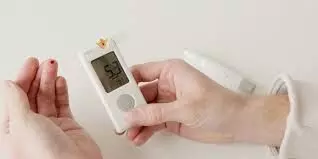- Home
- Medical news & Guidelines
- Anesthesiology
- Cardiology and CTVS
- Critical Care
- Dentistry
- Dermatology
- Diabetes and Endocrinology
- ENT
- Gastroenterology
- Medicine
- Nephrology
- Neurology
- Obstretics-Gynaecology
- Oncology
- Ophthalmology
- Orthopaedics
- Pediatrics-Neonatology
- Psychiatry
- Pulmonology
- Radiology
- Surgery
- Urology
- Laboratory Medicine
- Diet
- Nursing
- Paramedical
- Physiotherapy
- Health news
- AYUSH
- State News
- Andaman and Nicobar Islands
- Andhra Pradesh
- Arunachal Pradesh
- Assam
- Bihar
- Chandigarh
- Chattisgarh
- Dadra and Nagar Haveli
- Daman and Diu
- Delhi
- Goa
- Gujarat
- Haryana
- Himachal Pradesh
- Jammu & Kashmir
- Jharkhand
- Karnataka
- Kerala
- Ladakh
- Lakshadweep
- Madhya Pradesh
- Maharashtra
- Manipur
- Meghalaya
- Mizoram
- Nagaland
- Odisha
- Puducherry
- Punjab
- Rajasthan
- Sikkim
- Tamil Nadu
- Telangana
- Tripura
- Uttar Pradesh
- Uttrakhand
- West Bengal
- Medical Education
- Industry
Frequent Self-monitoring of Blood sugar improves glycemic control in Non-insulin-Treated diabetes Patients

Frequent Self-monitoring of Blood sugar improves glycemic control in Non-insulin-Treated diabetes Patients suggests a new study published in the Journal of General Internal Medicine
Self-monitoring of blood glucose (SMBG) is a useful tool in diabetes management, but its efficacy and optimal application in type 2 diabetes (T2D) patients treated without insulin have been controversial. We aimed to evaluate the efficacy of SMBG in controlling blood glucose levels in non-insulin-treated T2D patients and to determine the optimal frequency and the most appropriate population to benefit from SMBG.
Eligible publications from January 2000 to April 2022 were retrieved from PubMed, Embase, Cochrane Library, and ClinicalTrials.gov databases. Randomized controlled trials comparing SMBG with no SMBG or structured SMBG (S-SMBG, SMBG with defined timing and frequency of glucose measurements) were included. Meta-analyses and sub-analyses were performed to assess the efficacy, optimal frequency, and most appropriate population for SMBG. Risk of bias was assessed regarding randomization, allocation sequence concealment, blinding, incomplete outcome data, selective outcome reporting, and other biases.
Results:
Twenty-two studies involving 6204 participants were identified, including 17 comparing SMBG with no SMBG and 4 comparing SMBG with S-SMBG. SMBG reduced HbA1c (MD -0.30%, 95% CI -0.42 to -0.17) compared with no SMBG, and S-SMBG performed better than SMBG (MD -0.23%, 95% CI -0.38 to -0.07). Subgroup analyses showed that HbA1c control was better with SMBG at 8-11 times weekly (MD -0.35%, 95% CI -0.51 to -0.20) compared with other frequencies and with lifestyle adjustments (MD -0.37%, 95% CI -0.50 to -0.23) than with no adjustments. No significant differences in HbA1c were observed between baseline HbA1c subgroups (≤ 8% and > 8%, P = 0.63) and between diabetes duration subgroups (≤ 6 years and > 6 years, P = 0.72), respectively.
SMBG was effective for controlling HbA1c in non-insulin-treated T2D patients, although lacking detailed monitoring design. Better outcomes were seen with SMBG at 8-11 times weekly and lifestyle adjustment based on SMBG results.
Reference:
Zou Y, Zhao S, Li G, Zhang C. The Efficacy and Frequency of Self-monitoring of Blood Glucose in Non-insulin-Treated T2D Patients: a Systematic Review and Meta-analysis. J Gen Intern Med. 2023 Feb;38(3):755-764. doi: 10.1007/s11606-022-07864-z. Epub 2022 Nov 20. PMID: 36403159; PMCID: PMC9971532.
Keywords:
Frequent, Self-monitoring, Blood sugar, improves, glycemic, control, Non-insulin-Treated, diabetes, Patients, Zou Y, Zhao S, Li G, Zhang C, frequency; glycemic control; non-insulin; self-monitoring of blood glucose; type 2 diabetes, Journal of General Internal Medicine
Dr. Shravani Dali has completed her BDS from Pravara institute of medical sciences, loni. Following which she extensively worked in the healthcare sector for 2+ years. She has been actively involved in writing blogs in field of health and wellness. Currently she is pursuing her Masters of public health-health administration from Tata institute of social sciences. She can be contacted at editorial@medicaldialogues.in.


